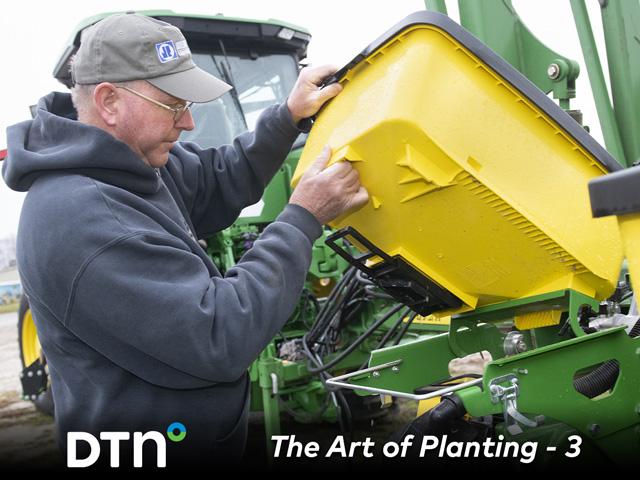The Art of Planting - 3
How U.S. Corn Yield Champion David Hula Overhauled His Planter to Get Better Results
Editor's Note: It takes planning, proper maintenance and more to master the art of planting. DTN/Progressive Farmer's special series "The Art of Planting" is showcasing National Corn Yield Contest winners who consistently prepare their planters for the field to achieve winning yields and share their tips. This is the third of the stories. Today well-known corn-yield champion David Hula shares how he rebuilt his planter to help give him an edge.
**
David Hula's planter is a bit like a 12-year-old's baseball glove. It's nice the day it comes home from the store smelling of leather and summer; but it's not actually ready for use for days, even weeks. A diligent Little Leaguer takes time to oil the leather to soften it up, to tuck a baseball in the webbing and wrap it with rubber bands, or even tuck it under a pillow to help mold the mitt to its task.
Hula first brought home his 2013 1770NT John Deere planter nearly a decade ago smelling of, say, grease and opportunity. It took him seven and a half years to mold it to his tastes. Along the way, he planted some of the world's best crops of corn, yields that rocketed over 600 bushels to the acre, setting records.
And, even then, he was still looking for an edge.
Hula tried to buy a new planter for the 2022 season, but in a testament to the severity of the ag manufacturing parts and labor crises, couldn't find one. Instead, he overhauled the machine he already had, stripping it to the frame.
As he prepares to plant his 2023 crop, he's once again focused on tailoring his machine in every way he can, molding it to his preferences like a kid with a mitt.
UPGRADE AT HAND
The key to Hula's planter for 2023 and beyond is a performance upgrade kit he bought from the James River Equipment John Deere dealership, in Tappahannock, Virginia, an hour and a half north of his Virginia Peninsula headquarters, southeast of Richmond.
P[L1] D[0x0] M[300x250] OOP[F] ADUNIT[] T[]
"We went to order a new planter for the 2022 season and John Deere was sold out; so, in the winter of '21, we worked with our dealer and asked about the performance upgrade kit," Hula said. "They explained what it was, and we decided to give that a try."
It was a change that came packed with plenty of technology, but it wasn't a complicated operation.
"You just unbolt the parallel arms, take that off and put a new unit on," he explained, gesturing to his planter. "This is all new. The only thing we kept was our gauge wheels, because we want the ability to put fertilizer on both sides. And, we continue to use the Precision Planting FurrowForce, because I do feel they have a superior closing system."
The new additions included the Deere brush delivery system, its hydraulic downpressure and its ExactRate liquid system.
"We added a liquid system on it. We already had a liquid system, but it was ground driven. Now we can control the fertility in each row," Hula said.
TWO IS BETTER THAN ONE
The retooled planter lived up to Hula's expectations last year in its first season.
"The thing I noticed was we had our best singulation we've ever had," he said. "It was great to have that in the first year. It usually takes us time to get acclimated to the equipment; it was spot on, so we were very pleased with our change."
It took Hula the better part of a decade to get everything dialed in the way he liked previously, however, and as happy as he was with his first year, he's not done tinkering.
The main change for his 2023 planting season is the addition of that second application of liquid fertilizer.
"It's funny when you get someone that comes into agriculture like Randy Dowdy, and we've been putting starter on one side of the row, and he says, 'If it's good on one side, why not put it on both?'â??" Hula said. "Really? How does he come up with that idea that easy? It does work, and we see big dividends," he added.
Hula's planter was set up that way previously, but he initially ran into problems trying to configure the upgrade kit to run like that. He resolved those issues this winter.
The way technology and equipment progress, Hula said he knows he's not in his 2013-model Deere planter for life. But, adding the upgrade kits did hold off any big moves on his part for at least a few more seasons.
He figures the upgrades came at less than half the cost he was expecting for an entirely new planter.
"As long as we maintain the frame and everything, this planter will go for another five years," Hula said. "There's no two planters alike in the whole country. Everyone has their own little unique way to do things. Everyone feels they have the best planter, and I feel we have a really good planter."
To see stories that have already run in this series, go to:
The Art of Planting - 1 at https://www.dtnpf.com/…
The Art of Planting - 2 at https://www.dtnpf.com/…
Joel Reichenberger can be reached at Joel.Reichenberger@dtn.com
Follow him on Twitter @JReichPF
(c) Copyright 2023 DTN, LLC. All rights reserved.






